The Billion Dollar Question: Who is the New Steve Jobs?
Note: A special thanks to Sam Mallikarjunan, the person who knew the answer to this before me.
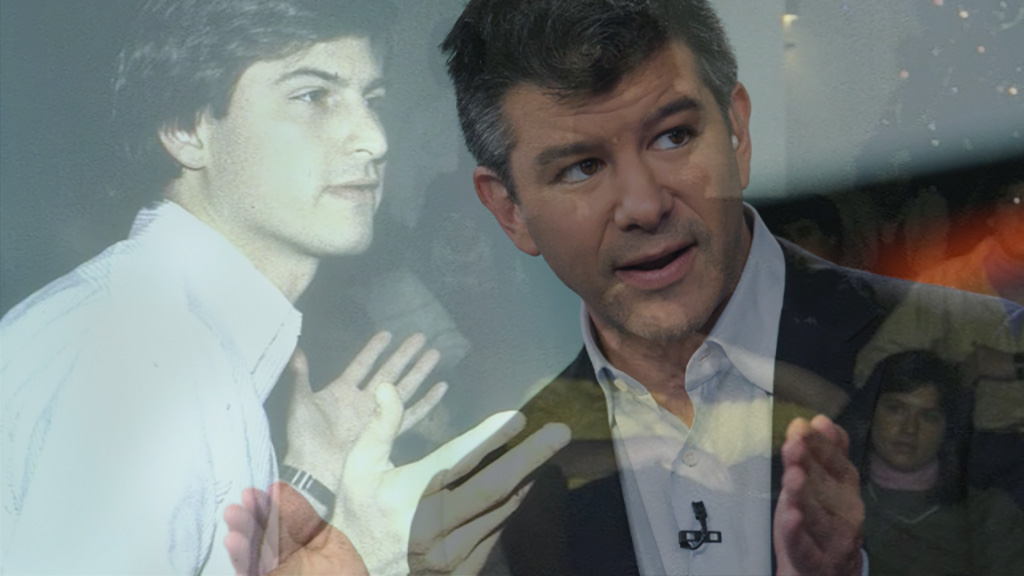
When I watch a Steve Jobs video on YouTube, my entire body tingles with motivation.
You know what I mean? That invincible feeling that permeates through your body and gives you hope that you, one little human being, can make the entire world a better place.
Right now, my entire body is tingling with motivation. But it’s not because I just binged on Steve Jobs’ video clips. It’s because I just binged on articles about Travis Kalanick, Uber founder and CEO.
I believe Kalanick is the new Steve Jobs.
Why does this question matter to me?
A while back, I read this book, called Smartcuts. It’s about accelerating your dreams by taking these things called smartcuts.
One smartcut that I’ve been unable to forget is the one about “mentorship.”
Mentorship is the secret of many of the highest-profile achievers throughout history. (Source)
According to the book, analysis shows that entrepreneurs who have mentors end up raising seven times as much capital for their businesses, and experience 3.5 times faster growth than those without mentors.
“A master can help you accelerate things,” explains Jack Canfield, author of the Chicken Soup for the Soul series and career coach behind the bestseller The Success Principles. He says… we can spend thousands of hours practicing until we master a skill, or we can convince a world-class practitioner to guide our practice and cut the time to mastery significantly. (Source)
The dilemma for most of us average folk is that we have this warped view of what mentorship actually is.
“Our typical paradigm for mentorship is that of a young, enterprising worker sitting across from an elderly executive at an oak desk, engaging in Q& A about how to succeed at specific challenges. On the other hand, a smartcut-savvy mentee approaches things a bit differently. She develops personal relationships with her mentors, asks their advice on other aspects of life, not just the formal challenge at hand. And she cares about her mentors’ lives too.” (Source)
But what do you do if you’re unable to reach the ultimate mentor for you? You take a play from the Jay-Z playbook…
Hip-hop icon Jay-Z gives us a clue in one of his lyrics: “We were kids without fathers … so we found our fathers on wax and on the streets and in history. We got to pick and choose the ancestors who would inspire the world we were going to make for ourselves.”
In ancient Greece, few people had access to the best mentors. Jay-Z didn’t either, but he had books from which he could get an inkling about what those kinds of mentors were like. (Source)
Jimmy Fallon didn’t know his dream mentors either so he did the same thing as Jay-Z.
“Jimmy had tirelessly followed his heroes in comedy. He fixated on the careers of comics like Sandler and Spade and tracked the movements of their management teams, agencies, films, and TV shows as if he was earning school credit for it. Jimmy’s goal since childhood, he explained to Siegel, had been to join the cast [of SNL].” (Source)
Ever since reading this book, I’m compelled to surround myself with the most brilliant people, who are 950,054,945,454 times smarter and more experienced than me. Unfortunately, the man I admired most died before I had the chance to ask him to be my mentor so I dug up what I could find on the Internet about him – Steve Jobs.
With every increase in communication, with every autobiography published, and every YouTube video of a superstar created, we increase our access to the great models in every category. This allows us to at least study the moves that make masters great— which is a start. (Source)
Steve Jobs is a controversial topic though, and that’s putting it lightly. Many argue that Jobs was nothing more than a ruthless asshole, who made people cry.
It’s widely known that’s he done a lot of crappy things – like denying he had a daughter and throwing one of his best friends and one of Apple’s first employees under the bus. And yes, I acknowledge that he was ruthless to others, who tried poaching his employees.
Maybe Jobs kind of was a jerk… sometimes; but aren’t we all… sometimes?
Use good judgement.
This is something I’ve come to live by, and I believe it’s something Jobs lived by.
He wasn’t committed to Apple because it would make him the richest man in the cementary. He was committed to Apple because he loved Apple with all his being. It’s transparent as day.
What ends would you go to for the person (or thing) you loved? Probably a lot.
That’s all Jobs was doing – protecting what he loved the best way he knew how. I admire him so much for it because very few people would go through hell and back for a company because most people look at work and love as two separate entities. Jobs didn’t, and I really admire that in a person.
For a long time, the YouTube clips, articles, biographies and forums fed my hunger to extract every lesson I could from Jobs. But I’ve run out of new lesson plans. I’ve watched every hidden interview, twice, and I can say his Stanford Commencement Speech in my sleep.
I’m ready for a real, live Steve-Jobs-worthy mentor, who I can actually bug to take a chance on guiding my journey.
And that is why figuring out who the next Steve Jobs is mattered to me.
Now that you know why I’ve binged on researching this topic, I’m going to get to the part of the post you’ve anxiously been scrolling down for – the reasons why Travis Kalanick is as special as Steve Jobs.
10 Reasons Travis Kalanick is the New Steve Jobs
“It’s not Pinterest where people are putting up pins. You’re changing the way cities work, and that’s fundamentally a third rail. We’re in a political campaign, and the candidate is Uber and the opponent is an as—hole named Taxi.” – Travis Kalanick
1. Users love Uber as much as Apple fanatics love their Apple products
A few months ago, I took a quick trip to south Florida to see friends and family. Since I sold my car when I relocated to Boston I was devastated to find out that Uber had been forced out of Broward County.
If you’ve ever taken a taxi then you’ve probably had an awful experience. There’s so many messed up things about the industry – safety, customer service, tipping, outrageous fees, slimy service. The list is endless.
So how the hell was I going to get around safely and affordably with Uber gone?
The next time I visited I went out of my way to purchase a rental car just to stick it to the cab drivers, who are about as pleasant as a root canal.
I’m not the only one of my Florida friends who boycotted taxis because they were so irate about the extraction of Uber from the city either. Just about all of them have.
I remember my friend Richie waiting to go downtown one night when I was home. He looked miserable just thinking about the fact that he once had this amazing solution at the click of a button and now, he was forced to contemplate taking a ridiculously inconvenient and expensive cab ride. No way. He decided to drive, and pick up his car the next morning from downtown.
GrowthHackers points out that Uber is virally successful because its offering is totally mindblowing compared to the frustratingly broken taxi experience.
“Uber provides a solution to a real problem that impacts millions of people. In all senses of the word they have disrupted the monopoly of taxi cab transportation that exists in many cities and reinvented the experience from top to bottom.
Among the many problems Uber is tackling are: poor cab infrastructure in some cities, poor service and fulfillment–including dirty cabs, poor customer experience, late cars, drivers unwilling to accept credit cards, and more.
Uber set out to reimagine the entire experience to make it seamless and enjoyable across the board. They didn’t fix one aspect of the system (e.g. mobile payments for the existing taxi infrastructure), they tackled the whole experience from mobile hailing, seamless payments, better cars, to no tips and driver ratings.
By avoiding the trap of smaller thinking, and iterating on one element of the taxi experience (say, by making credit card payments more accessible in the car) they were able to create a wow experience that has totally redefined what it means to use a car service, sparking an avalanche of word of mouth and press.”
The crazy thing is Uber acquires new users almost entirely through word-of-mouth referrals. It’s instantly addictive.
“We’ve found that our growth is driven substantially by word of mouth. When someone sees the ease of use, the fact that they press a button on their phone and in under 5 minutes a car appears, they inevitably become a brand advocate.” (Source)
Like my Florida friends, some Uber riders aren’t passively waiting for Uber to be reinstated in its city. In fact, it’s quite the opposite.
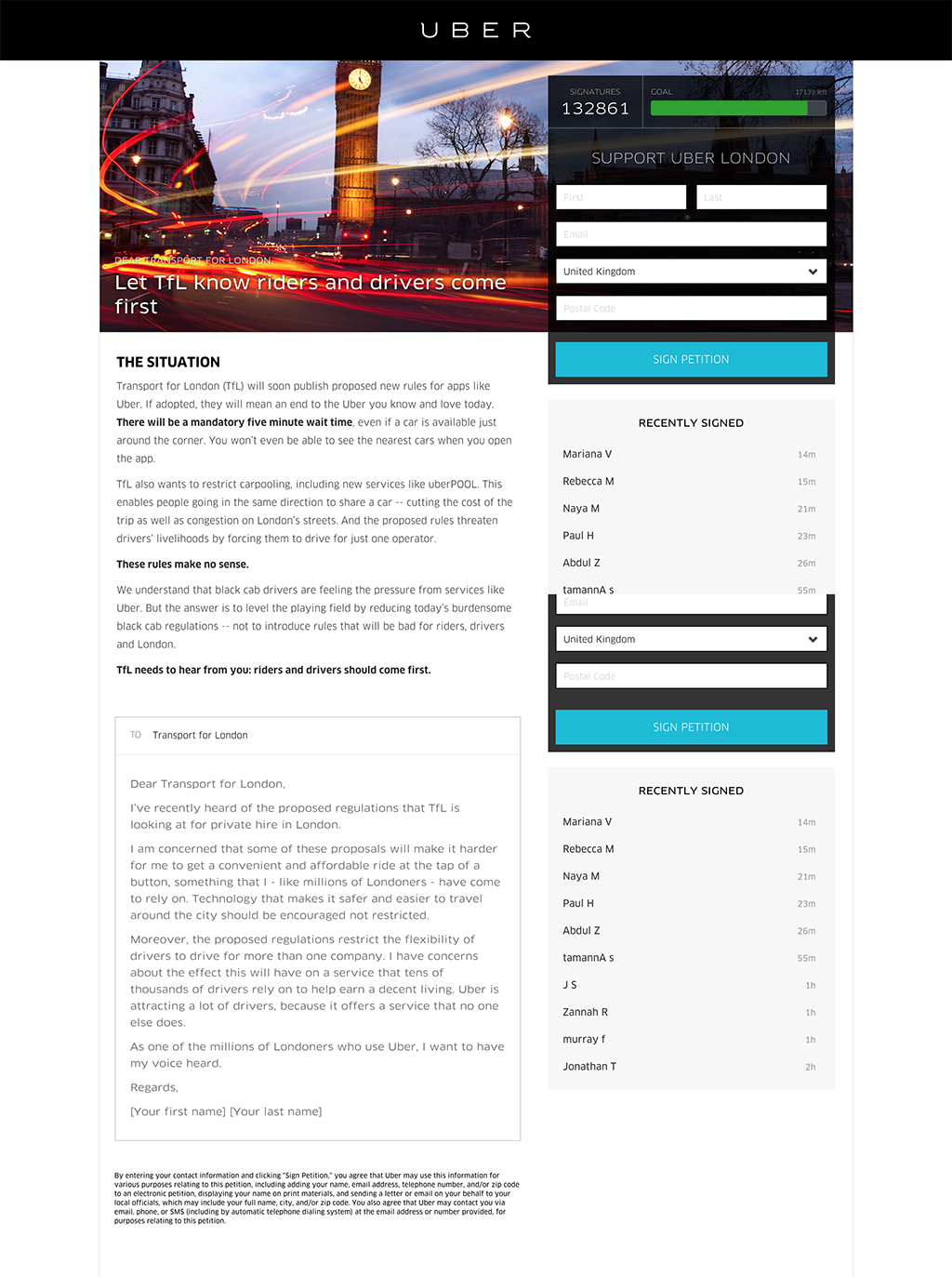
Riders are actually fighting by signing Uber’s petition. It’s amazing how fast these Uber petitions get massive amounts of signatures.
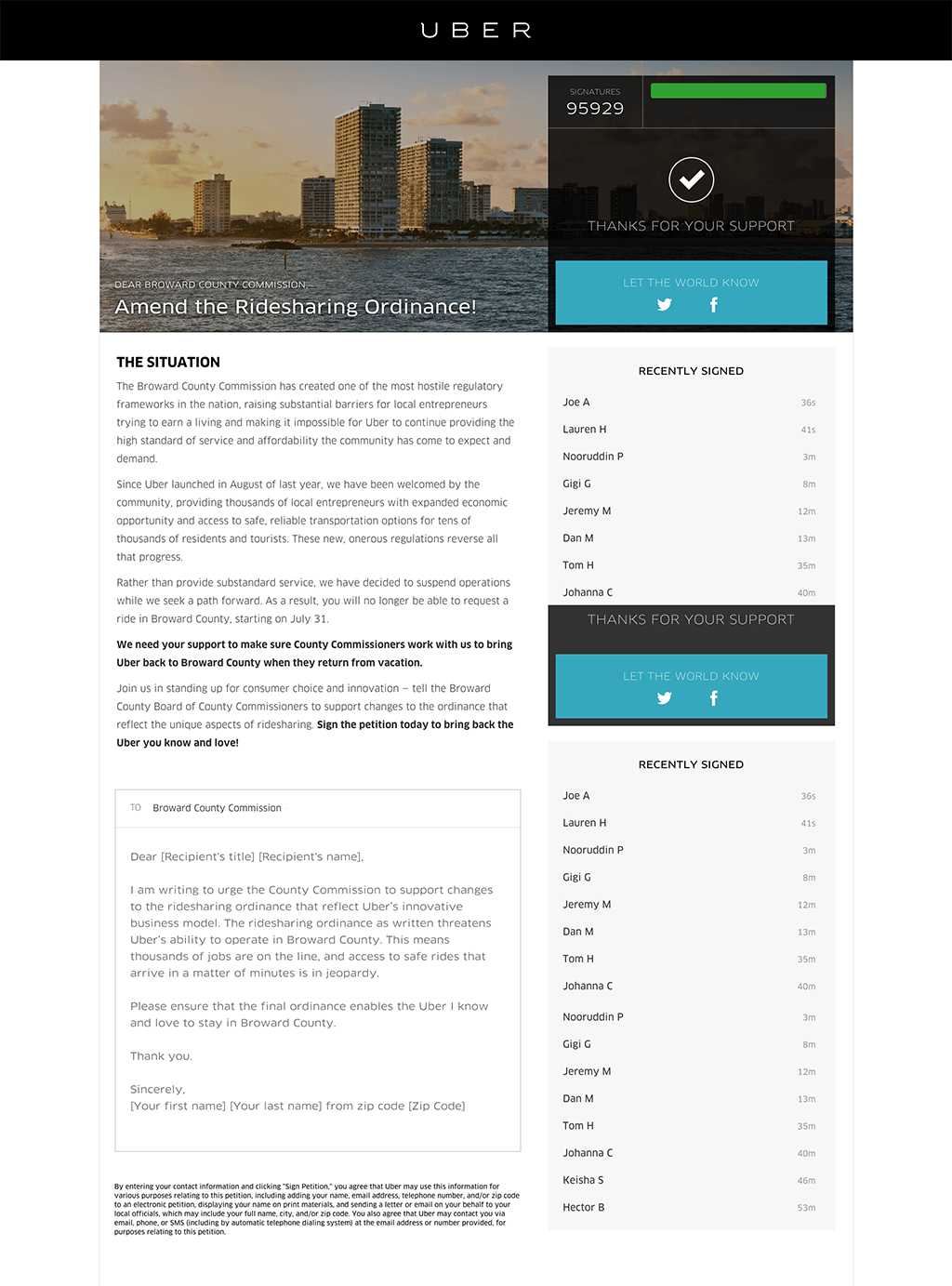
2. Kalanick is real
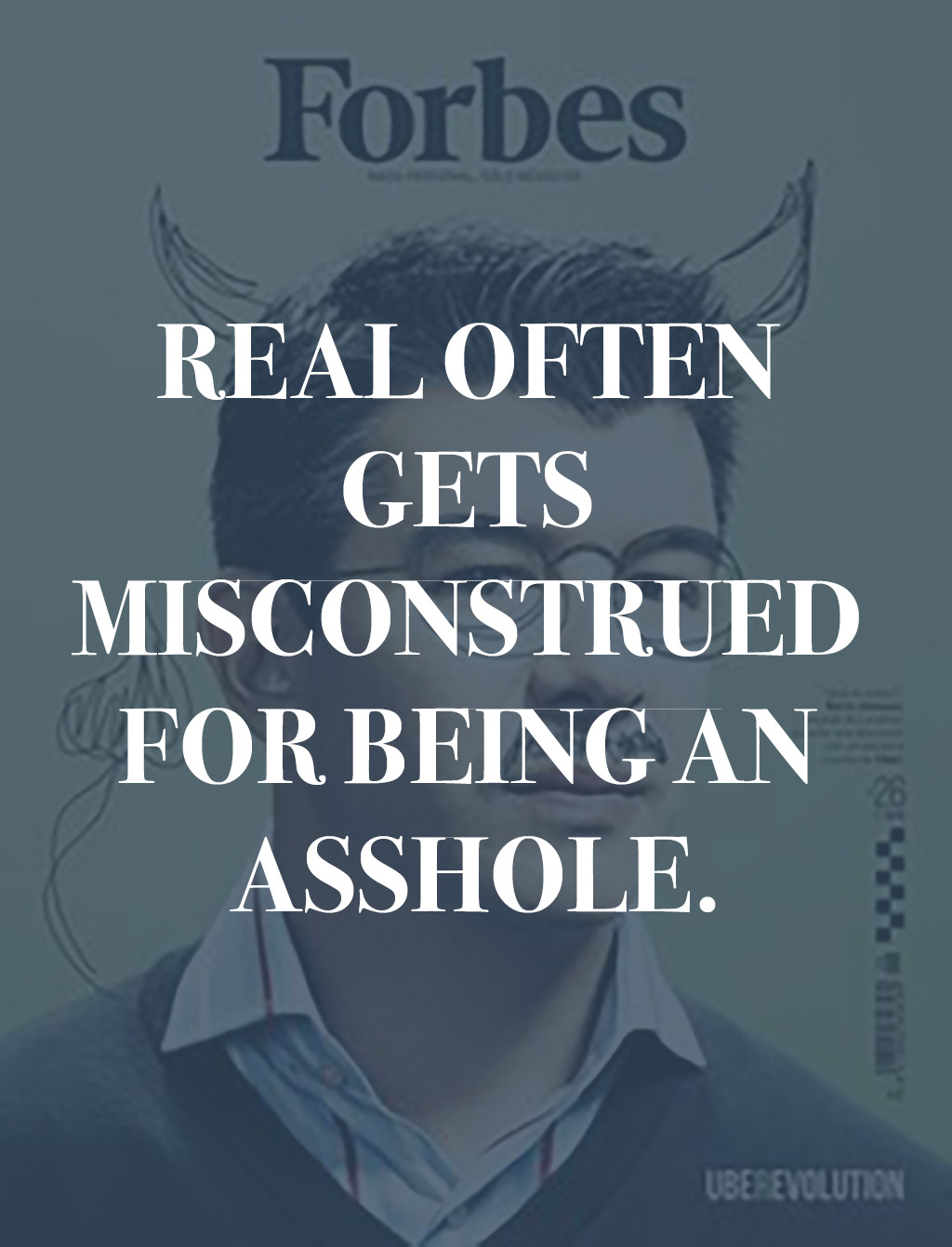
A lot of people have used not-so-nice a-words to describe Jobs and Kalanick more than once. I think this is unfair because they’re actually just being real, which often gets misconstrued for being an asshole.
Walter Isaacson elaborates on Steve Jobs tendency to be an asshole sometimes:
Jobs was famously impatient, petulant, and tough with the people around him. But his treatment of people, though not laudable, emanated from his passion for perfection and his desire to work with only the best.
It was his way of preventing what he called “the bozo explosion,” in which managers are so polite that mediocre people feel comfortable sticking around.
“I don’t think I run roughshod over people,” he said, “but if something sucks, I tell people to their face. It’s my job to be honest.”
When I pressed him on whether he could have gotten the same results while being nicer, he said perhaps so.
“But it’s not who I am,” he said. “Maybe there’s a better way—a gentlemen’s club where we all wear ties and speak in this Brahmin language and velvet code words—but I don’t know that way, because I am middle-class from California.” (Source)
These men aren’t assholes. People just aren’t used to people being so direct, something I believe everyone should get more comfortable with.
Since I didn’t know Jobs, and I don’t know Kalanick, I can’t be 100% certain about this accusation – but it seems to me that both entrepreneurs enjoy(ed) pissing (some) people off.
Like one investor said, “It’s hard to be a disrupter and not be an asshole.”
I believe this has to do with something known as The Copenhagen Interpretation of Ethics, which says:
“When you observe or interact with a problem in any way, you can be blamed for it. At the very least, you are to blame for not doing more. Even if you don’t make the problem worse, even if you make it slightly better, the ethical burden of the problem falls on you as soon as you observe it. In particular, if you interact with a problem and benefit from it, you are a complete monster.”
The same author illustrates his point by using Uber as a prime example of this phenomenon.
“There are times when it’s almost impossible to get a taxi – when there’s inclement weather, when a large event is getting out, or when it’s just a very busy day. Uber attempts to solve this problem by introducing surge pricing – charging more when demand outstrips supply. More money means more drivers willing to make the trip, means more rides available. Now instead of having no taxis at all, people can choose between an expensive taxi or no taxi at all – a marginal improvement. Needless to say, Uber has been repeatedly lambasted for doing something instead of leaving the even-worse status quo the way it was.”
3. All he does in win, win, win, no matter what
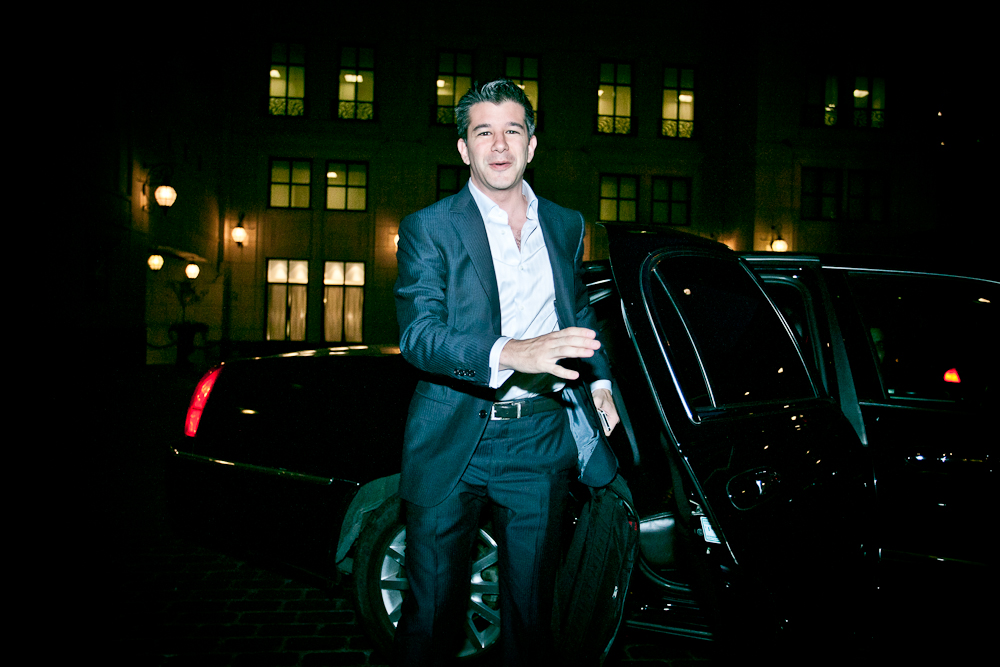
I don’t want to bring a gun to knife fight…I want to bring a magic f-ing wand. I want to obliterate the competition. My goal is to rig the game so I don’t just win, but absolutely crush the competition. That’s the kind of fight I’m interested in. But what about being fair? I don’t care about fair. I care about winning. – Hustle
That’s the kind of fight Jobs played when he was alive, and it’s certainly the fight Kalanick thrives in.
Remember Apple’s infamous 1984 advertisement, shaming IBM? (If you don’t, watch it below. It’s awesome.)
Or his hilarious zinger about Microsoft in his Stanford Commencement Speech?
“…And since Windows just copied the Mac, it’s likely that no personal computer would have them.” – Steve Jobs
Jobs was infamous for framing his competitors as villains in well-told stories and campaigns. Kalanick does the same thing.
I love how he describes the taxi industry (because they totally deserve to be called out for the shoddy service they provide at ridiculous prices):
“We have to bring out the truth about how dark and dangerous and evil the taxi side is.” – Travis Kalanick
And if you didn’t think the cab industry was evil before then just read this amazing Buzzfeed article on how Uber just won its legal battle to conduct service in Las Vegas.
“My politics are: I’m a trustbuster. Very focused. And yeah, I’m pro-efficiency. I want the most economic activity at the lowest price possible. It’s good for everybody, it’s not red or blue.” – Travis Kalanick
Not only is Kalanick good at bringing villains to light, but he’s also fantastic at negotiating – another reason he wins all the time.
“Stand by your principles and be comfortable with confrontation. So few people are, so when the people with the red tape come, it becomes a negotiation.” – Travis Kalanick
But it’s this quote by him that makes me believe he uses good judgement to make decisions and that he’s genuinely doing what he believes he has to in order to win.
On Ayn Rand and “Atlas Shrugged”: “I like the book. Do you have a problem with that? … I just think it’s a great story of somebody who stood up for what they believe in.”
All Kalnick’s doing is standing up for what he believes in. I applaud him for it.
4. Recruiting is a priority
Steve Jobs didn’t know how to play an instrument. He knew how to play the orchestra.
“I think that I’ve consistently figured out who really smart people were to hang around with. No major work that I have been involved with has been work that can be done by a single person or two people, or even three or four people. Some people can do one thing magnificently, like Michelangelo, and others make things like semiconductors or build 747 airplanes – that type of work requires legions of people. In order to do things well, that can’t be done by one person, you must find extraordinary people.” – Steve Jobs
He wanted extraordinary people so badly because he loved his baby more than anything, and like any obsessive parent, you sometimes do the wrong thing to “fix” the game. In the case of Jobs, he probably shouldn’t of emailed Eric Schmidt to tell him to stop poaching Apple engineers. But he did. That makes him human.
And it makes Kalanick human too.
It appears Kalanick loves Uber as much as Jobs loved Apple; therefore, it’s natural he’d be as obsessed as Jobs about hiring. This would make him want to recruit the absolute best people – the type of people who would definitely be doing something else at the time of an offer.
Like how Brian McClendon, the former head of Google Maps, was working at Google before Uber poached him.
5. Uber campaigns are original and creative
If it’s one thing I believe Jobs excelled at, it’s marketing. He knew how to make people feel something for Apple.
Remember his iconic “Think Different” campaign? People can repeat this ad in their sleep.
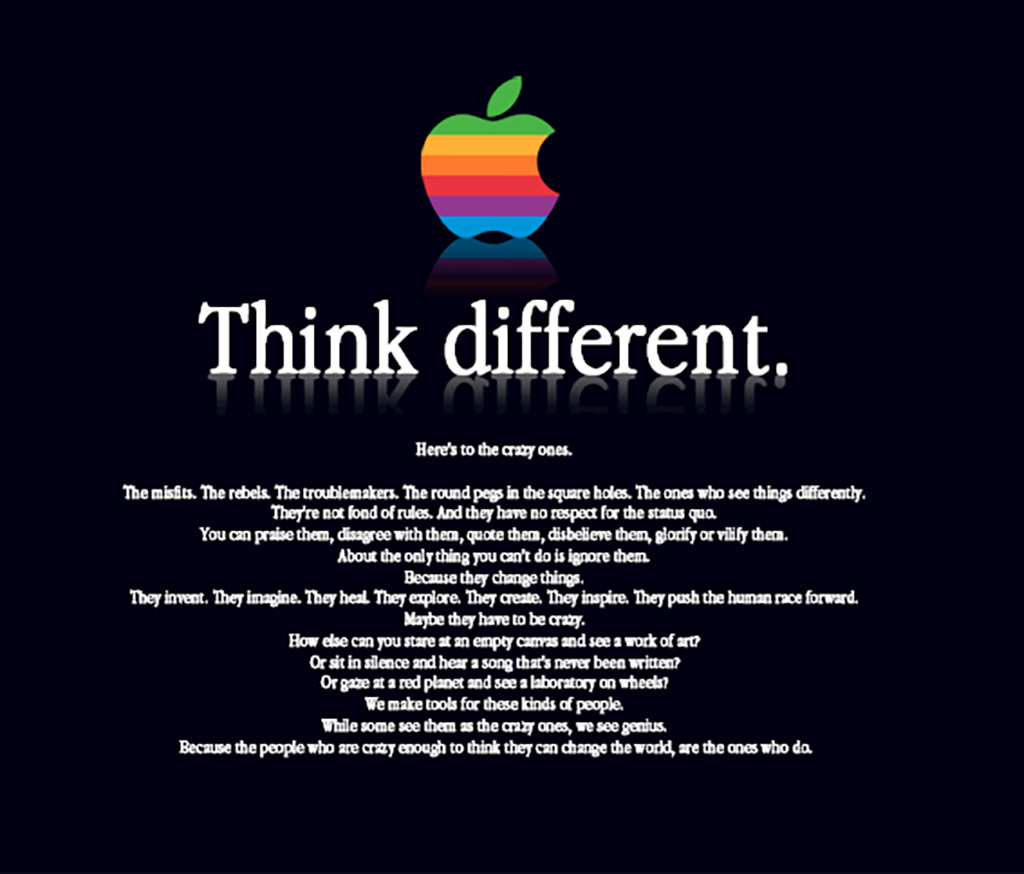
Jobs was a master of stunt marketing, and Kalanick is certainly worthy of taking over his title. Here are just a few of Uber’s recent promotions.
UberSafe in Toronto: A sidewalk kiosk—dreamed up by agency Rethink and built by design and fabrication studio Stacklab—functions as a typical breathalyzer. You blow through a disposable straw for six seconds, and it analyzes the alcohol content in your breath. If you’re over the legal limit, [Uber] offers you a ride home.
UberMENTOR in Boston: Recently, in Boston, for a few hours one day you could ride for free with some of the most brilliant people in Boston for an event going on known as HUBWeek.
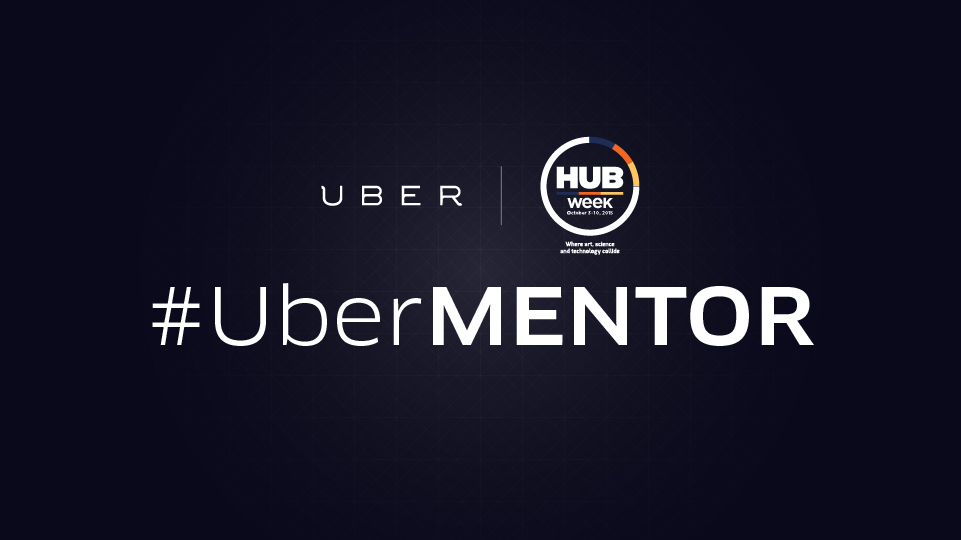
There’s also a few salty campaigns, reminiscent of that 1984 IBM campaign but with Uber’s flair, such as its campaign against Lyft that poaches its drivers.
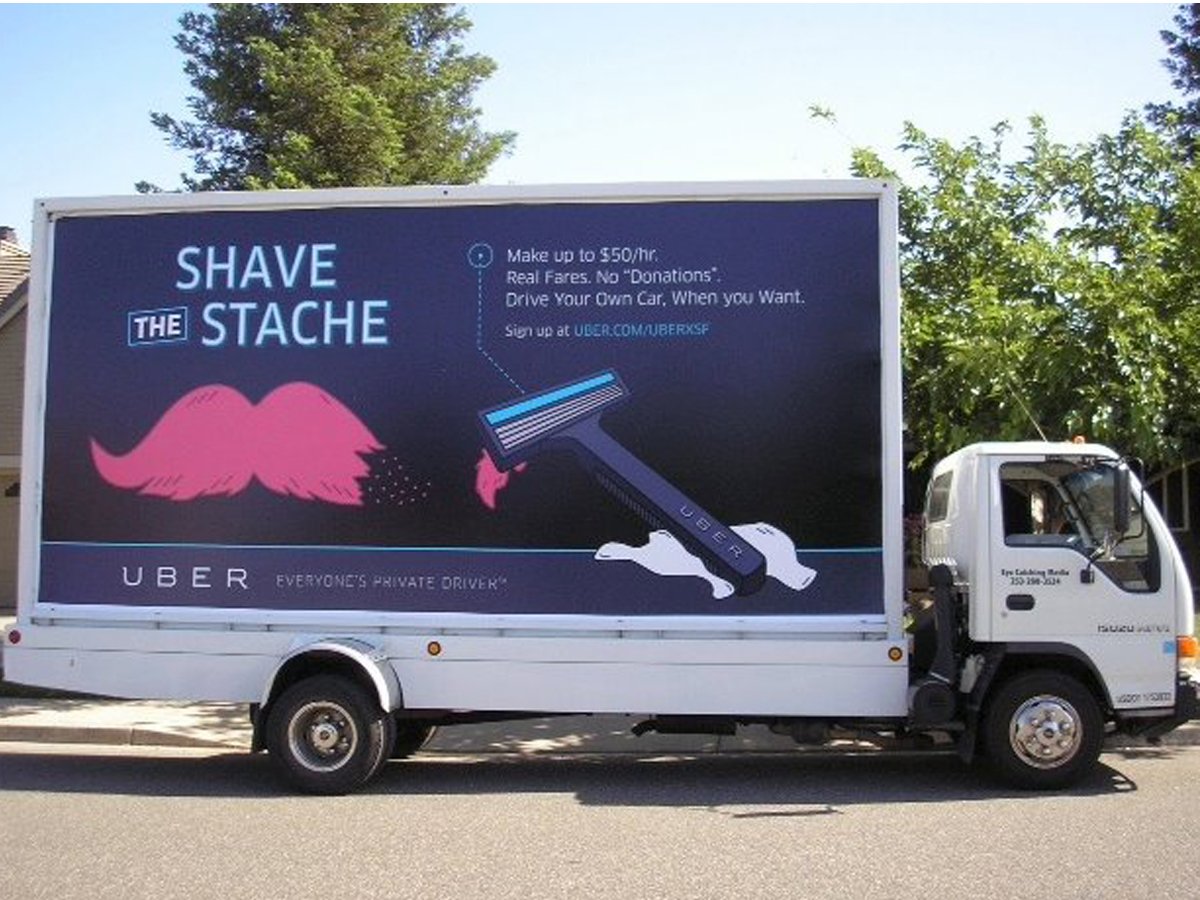
Or when Uber bought a masthead in the New York Times to call out the mayor for not supporting them.
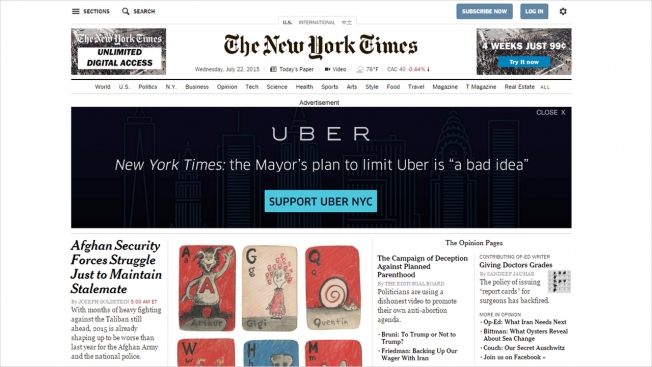
6. He is committed to Uber
According to Vanity Fair, for all his rough edges, Kalanick’s commitment to his company is almost tender at times. When he is asked if he will sell Uber to a bigger player, such as Google, he seems genuinely shocked.
“You’re asking somebody who has a wife and is really happily married, ‘So, what’s your next wife going to be like?’ And I’m like, ‘What?’” (Source)
7. Uber puts users before profits
When Jobs and his small team designed the original Macintosh, in the early 1980s, his injunction was to make it “insanely great.” He never spoke of profit maximization or cost trade-offs.
“Don’t worry about price, just specify the computer’s abilities,” he told the original team leader. At his first retreat with the Macintosh team, he began by writing a maxim on his whiteboard: “Don’t compromise.”
The machine that resulted cost too much and led to Jobs’s ouster from Apple. But the Macintosh also “put a dent in the universe,” as he said, by accelerating the home computer revolution. And in the long run he got the balance right: Focus on making the product great and the profits will follow.
That’s precisely what Kalanick is doing when he poaches Lyft drivers to Uber.
He is trying to make his product better, which gets better with the more supply there is. And he keeps them driving by paying exuberant hourly rates to sit and wait for clients, which has to take a toll on profits.
Kalanick even invested in massive battle plans, such as an Uber program called SLOG…
Using contractors it calls “brand ambassadors,” Uber requests rides from Lyft and other competitors, recruits their drivers, and takes multiple precautions to avoid detection. The effort, which Uber appears to be rolling out nationally, has already resulted in thousands of canceled Lyft rides and made it more difficult for its rival to gain a foothold in new markets. Uber calls the program “SLOG.” (Source)
8. He knows the big picture and the details
“Some CEOs are great at vision; others are managers who know that God is in the details. Jobs was both,” Isaacson says.
Time Warner CEO Jeff Bewkes says that one of Jobs’s salient traits was his ability and desire to envision overarching strategy while also focusing on the tiniest aspects of design.
For example, in 2000 he came up with the grand vision that the personal computer should become a “digital hub” for managing all of a user’s music, videos, photos, and content, and thus got Apple into the personal-device business with the iPod and then the iPad.
…But even as he was laying out these grand visions, he was fretting over the shape and color of the screws inside the iMac. (Source)
Just like Jobs again, Kalanick is one the rarities who is sees the vision and the details.
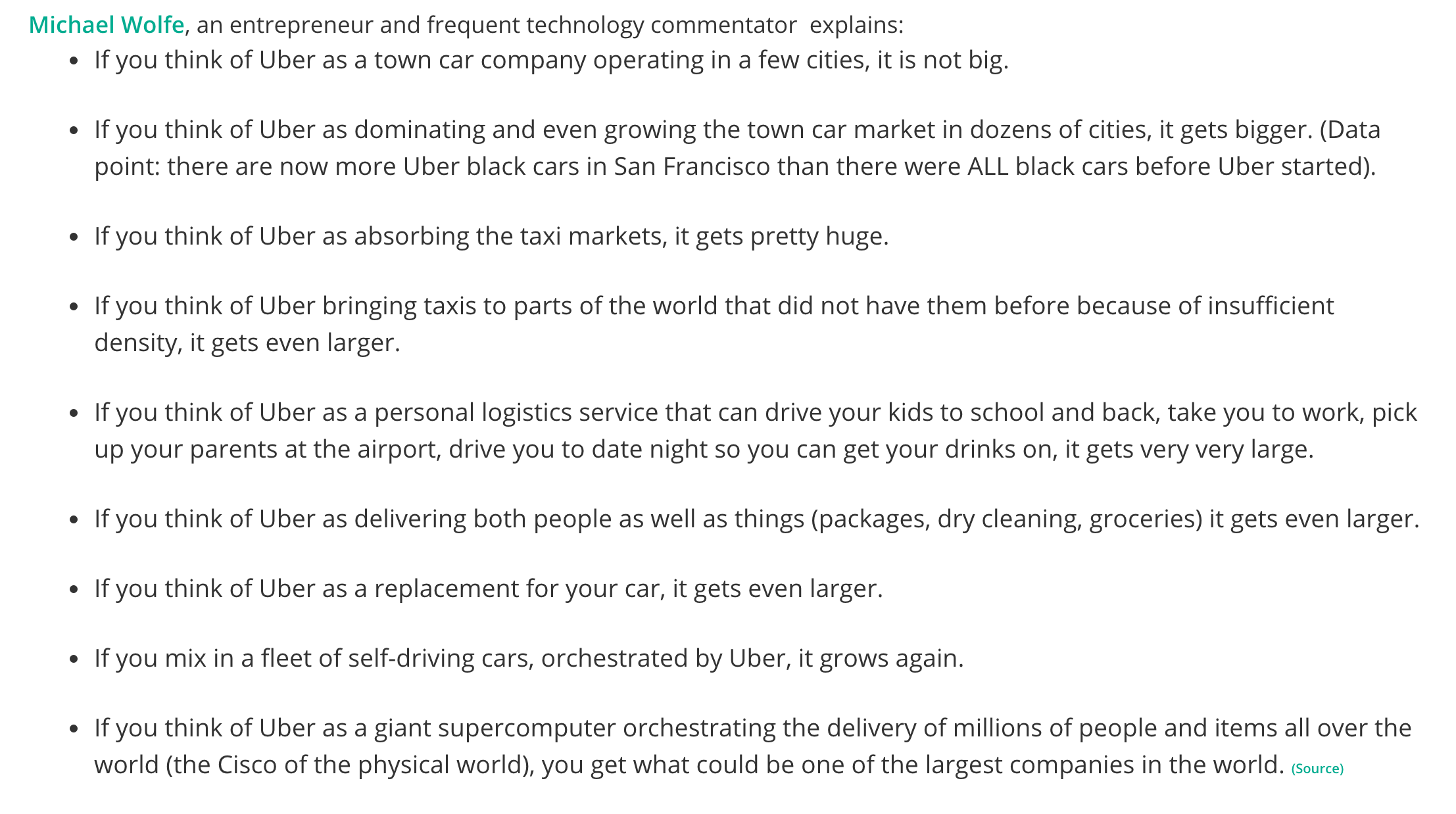
9. He’s a rebel
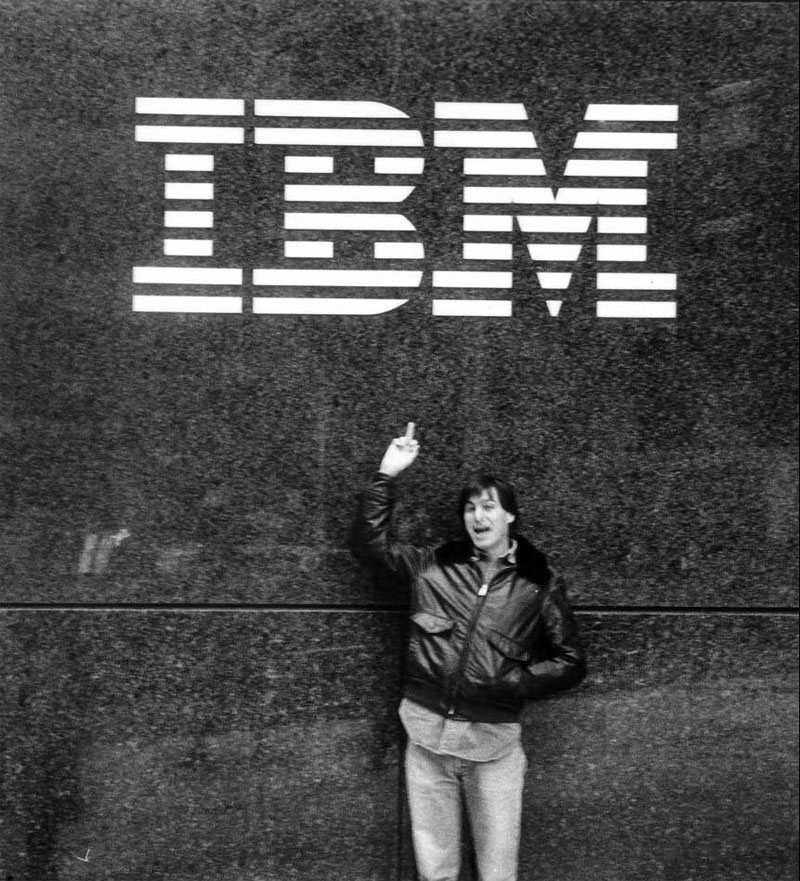
I don’t think anyone would disagree that Jobs was a rebel, and I do think it’s transparent that Kalanick is too. Furthermore, like Jobs, I believe Kalanick embraces being a rebel, which I love.
“If you bring that scrappy fierceness with you it works until you get big, when really pushing all the way really feels uncomfortable…When you’re the little guy that’s lauded, that’s heroic.” – Travis Kalanick
10. He has good taste
“Uber is efficiency with elegance on top. That’s why I buy an iPhone instead of an average cell phone, why I go to a nice restaurant and pay a little bit more. It’s for the experience.” – Travis Kalanick
“The experience…” Who have I heard talk about this before?
Oh yeah – Steve.
What makes Apple’s iconic 1984 ad so electrifying is the experience it created. It made you feel something. It made me feel something, and I wasn’t even alive yet.
“What was remarkable about that commercial, especially for a high-tech product, is that we never once showed the product or mentioned any technical characteristic of the product,” John Sculley, Apple co-founder says. “All we did was sell the experience that something exceptional was going to happen on January 24, 1984.” (Source)
Comparing Uber to Lyft is like comparing Apple to Microsoft.
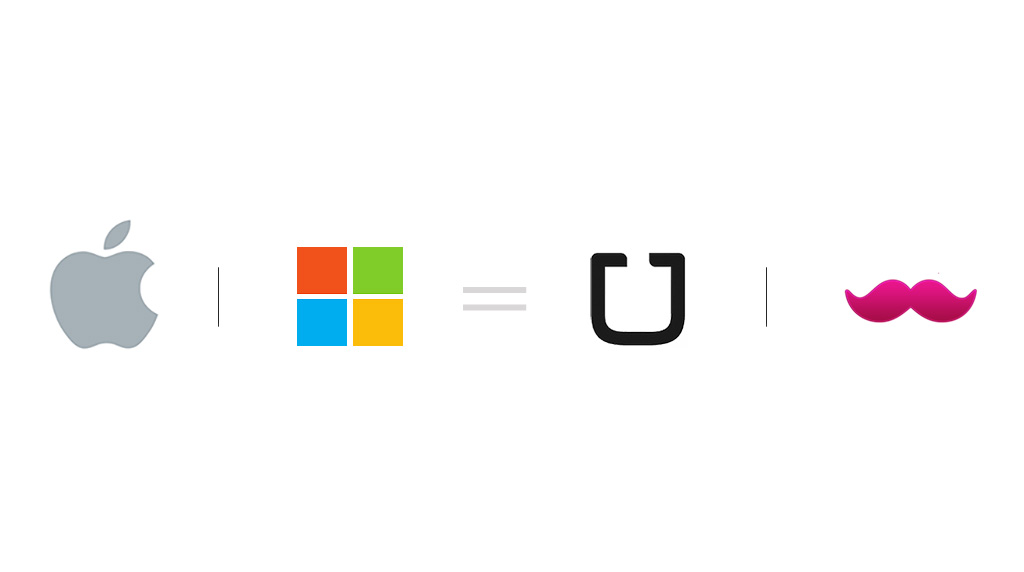
One just has obviously better taste.
You experience this from the moment you open the two apps to the second you see your car arriving. You know which car is from Uber and which one is from Lyft before you ever jump in, and it’s not because the Lyft driver has a pink mustache on its vehicle. It’s because the Lyft car is not as nice.
Conclusion
Everyone has someone they admire. These just so happen to be the two people I admire the most in the world, and so I’m willing to make a case for them.
Who are you willing to make a case for?
 Lauren Holliday
Lauren HollidayLauren Holliday is a full-stack marketer.




